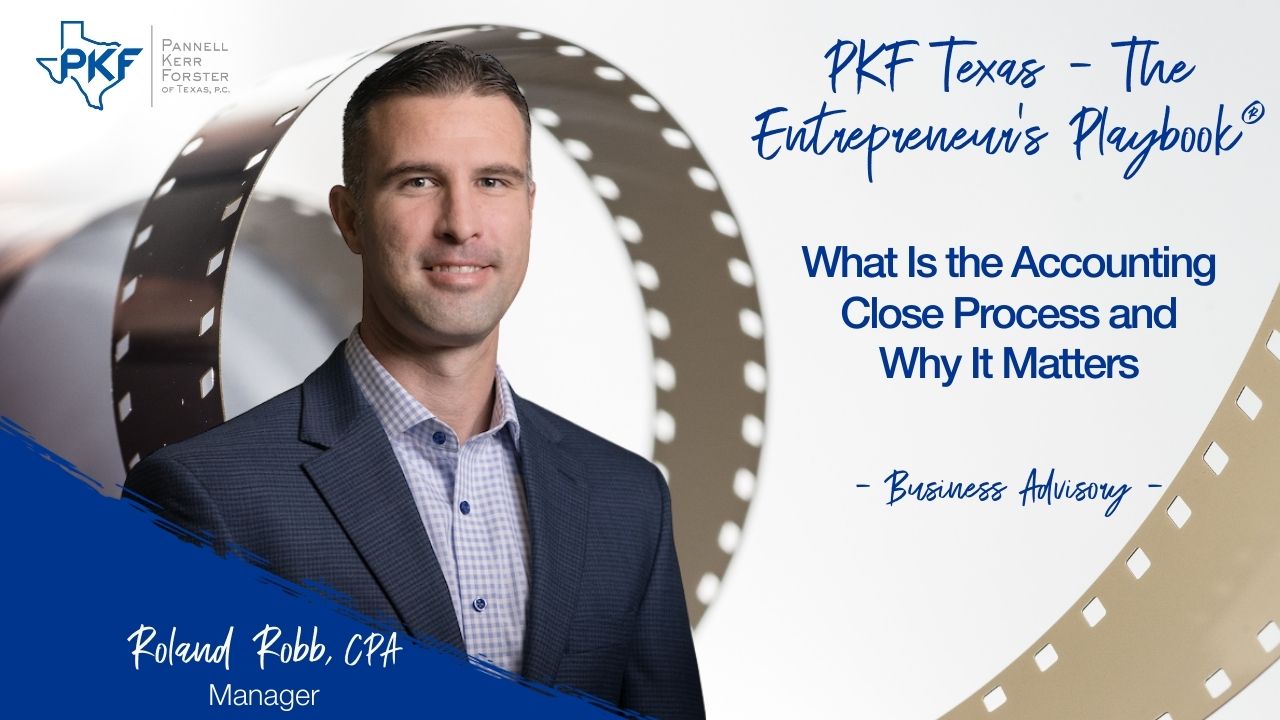What Is the Accounting Close Process and Why It Matters

In this episode of PKF Texas – The Entrepreneur’s Playbook®, Roland Robb breaks down the purpose and importance of the accounting close process. Whether monthly, quarterly, or annually, closing your books ensures your financial data is accurate, complete, and ready to support business decisions, compliance, and reporting needs.
Transcript Below
Jen: This is the PKF Texas – The Entrepreneur’s Playbook®. I’m Jen Lemanski and I’m here with Roland Robb, one of the Approachable Advisors® on our business advisory services team. Roland, welcome to the Playbook.
Roland: Hi, glad to be here.
Jen: So, our business advisory services team, they consult with a lot of different clients in a lot of different industries. And I know, I’ve heard you talk about accounting close and how we advise our clients on that. What is it?
Roland: Accounting close is a very common practice where companies have a process too. It’s a series of steps where you finalize your financial statement preparations internally at the end of a particular accounting period.
Jen: And so why is it important for them to do that? Shouldn’t they just do that?
Roland: So, it’s important. The classic phrase you hear garbage in, garbage out. So, the accounting close process ensures that you’re getting good financial data. It’s a way to ensure that at the end of whatever accounting period you’re working on, your company’s, your entity’s financial data is complete and accurate. It’s a good control process to have in place to try to identify any missing transactions that aren’t recorded, any transactions that are recorded that should not be.
It’s a first step in trying to identify potential fraud or just other errors that have crept into the system. It’s a way to identify and correct those. And in going through this process, it can give an entity’s management confidence that the financial data that they’re reviewing to make important business decisions, they can rely on that data and make good decisions with it.
Also, by doing this process, it makes it easier to meet any external reporting requirements your entity may have, whether it’s to lenders, to potential buyers or sellers, or audit or compliance needs that you may have.
Jen: So, it really is a good tool for you to know how your business is doing.
Roland: Very much a common best practice. And that practice includes on whether it’s a monthly basis or a quarterly basis or an annual basis. It is the process of reconciling your bank and credit card and other transactional accounts. It is reviewing the transaction activity recorded in your books to make sure things are correct, things are in the right account.
It is recording accrual related journal entries, such as for prepaids, for fixed asset depreciations, et cetera. And once that process is complete, preparing financial statements internally for management’s use.
Jen: And you mentioned you could do it annually, quarterly, monthly. What do we typically recommend?
Roland: At minimum, it’s good to do a closing process at least annually for inactive or dormant entities, an annual close is probably okay, but for active operating entities, good best practice that we recommend is to at least do your close monthly.
Jen: Perfect. Sounds good. Well, I’ve got some more questions related to business advisory topics. Can I get you back?
Roland: Sure thing.
Jen: All right. This has been another Thought Leader Production brought to you by PKF Texas – The Entrepreneur’s Playbook®. For more information about this and other topics, visit our blog pkftexas.com/insights. Tune in next week for another chapter.

